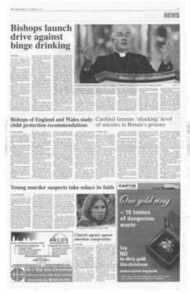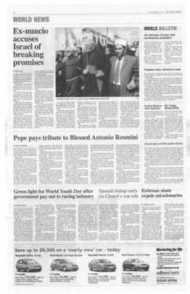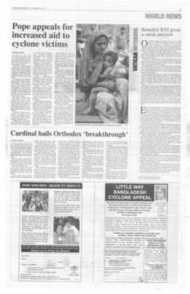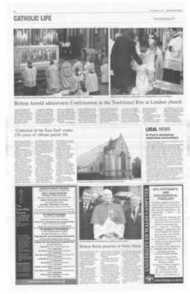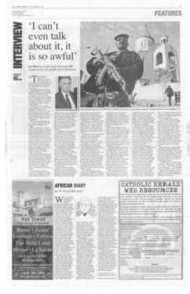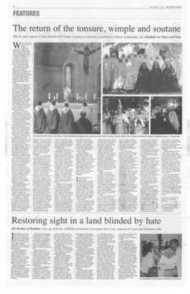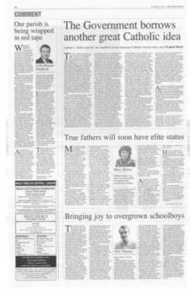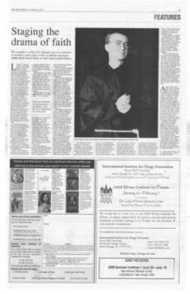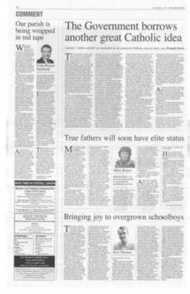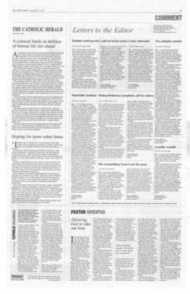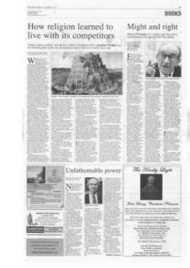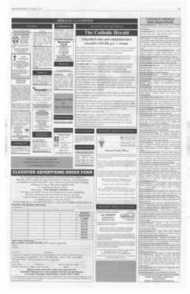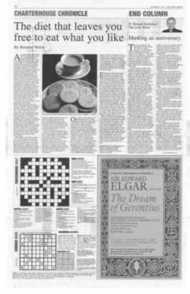Page 7, 23rd November 2007
Page 7

Report an error
Noticed an error on this page?If you've noticed an error in this article please click here to report it.
Tags
Share
Related articles
Life Was Better Under Saddam, Say Christian Refugees
Saddam Is Evil, But So Is The Ruination Of Iraq
The Nun Helping Iraq's Underground Exiles
Peace Vigil Marks Invasion Of Iraq
Bombers Slaughter Iraqi Christians
'I can't even talk about it, it is so awful'
Ed West meets the Iraqi Christian MP trying to save his people from extinction
wice Saddam sentenced me to death: once in 1973 and then in 1984.1 was released as a compromise, but he hanged many of us. And since 2003 they have tried to kill me three times."
When people talk about "doing an impossible job", it is usually in reference to being England football manager or head of one of the government's unwieldy bureaucracies. For Yonadam Kanna, sole MP of Iraq's Christian party, the Assyrian Democratic Movement, the job in question is saving his people from extinction.
The 56-year-old, who speaks seven languages, has risked his life fighting the "chauvinism" of Saddam since the early 1970s. He is now in Europe to plead for help from MPs and Vatican officials, and to meet members of the Assyrian diaspora, Iraq's indigenous Christian minority.
"Everyone was sympathetic to us," he says of the 10 British MPs he met. But sympathy is not enough.
When we meet at the Assyria House in west London, a policeman stands guard for Kanna's security, making me feel strangely less safe. Back in Baghdad he is protected by 15 bodyguards around the clock, and his 30-minute route from work to home often has to be re-routed to dodge the assassins. Yet despite the constant threats to his life he says he hates being out of his country even for two weeks, The father of three and grandfather of two has a daughter living in Baghdad, a dangerous place for Christian women in particular.
The plight of Christian Assyrians has worsened since the "liberation". Islamists and Kurdish paramilitaries have murdered hundreds, and half the Christians have fled the country, mainly to neighbouring countries where they live in squalor and misery. With the exception of Sweden, the West has avoided eyecontact.
The Americans and British executed the "liberation" as badly as they executed Saddam. Central to their failure was the policy of disbanding the military and political structure. 'The Coalition didn't develop the army between 2003 and 2005, and the de-Baathification process became too politicised," Kanna says, arguing that it became little more than a score-settling process. "If I wanted, 1 could get files saying that George Bush's father or Jesus Christ was a 13aathist."
He continues: "Only in the past 10 months they have built up the police. The trust and respect is coming back, but you can't force people to have peace. You need reconciliation and forgiveness. It's very easy to slip back to how it was. Every citizen needs to feel they have a share in the country otherwise they won't defend it."
All through the recent troubles — the bombings of at least 14 churches, hundreds of murders, rapes and kidnappings — the faith of Christians in Iraq has grown stronger, yet this is a double-edged sword. "In recent times religion has helped people, our laws and principles of love and forgiveness. Yet we are paying the taxes for the Americans and the British because we are seen as cousins."
Kamm is himself a Catholic, though the Assyrian Democratic Movement is not. "We're a secular party, we encompass all faiths," he explains. The Christians feel that their opponents have exploited sectarianism, dividing Christians into members of the Assyrian Church of the East, Syriac Catholic Church, Syriac Orthodox Church and smaller Protestant groups.
Divide and rule works on a larger scale, too. Karma says he comes to Britain not just as an Assyrian but also as an Iraqi. "When it rains in Iraq, it rains on all of us. If I go to speak I go to speak for all of Iraq. I represent my people and all of my country."
A member of Iraq's reconciliation committee, Karma recently met Archbishop Desmond Tutu: a model, he says, of Christian forgiveness and healing, just what is needed now. "There is corruption and no public services, but the worst thing is tribal selfishness."
This is getting worse in the north, where Assyrians are mainly concentrated. In Kirkuk, a city disputed by two ethnic groups with plenty of oil to fan the flames. Saddam's ethnic cleansing is being reversed by the Kurds, primarily by bribing kinsmen to come in before the American-sponsored plebiscite. On top of this. Turkey has threatened to invade to prevent Kurdish paramilitaries from using Iraq as a base. The Assyrians are stuck in the middle of all this.
Last week Kanna went to the Vatican, having addressed the Pope in a letter last month. "I wrote to the Holy Father thanking him for advis ing the Turkish authorities not to invade the country. Secondly, thanking for him for his decision to make the Patriarch cardinal for the first time in history. And thirdly, we told His Holiness about the suffering of our people in Iraq. We called for peace and prayers for our people."
Never has a Christian nation needed it more. "There is encroachment on our villages in the Nineveh plain, and every year in Mosul they auction off Assyrian land while we have to watch. Baghdad has been emptied of Assyrians. I'm worried that in 100 years we won't have any land." Most Assyrians would say that this timetable is optimistic, that without international help they will disappear in a decade.
They walk a political tightrope; to paraphrase Bill Clinton. it's the autonomy, stupid. The Iraqi constitution calls for an "administrative area" in the Nineveh plains for the Assyrians and Iraq's other embattled minorities: the Shabak, Turkomen, Mandaeans and Yezidi. All have suffered, not least the Yezidi, whose ancient dualist religion is portrayed as devil worship by Islamists. On August 14 a suicide bomber killed 400 Yezidis in Iraq's worst single massacre.
"Were not against autonomy," Kanna says, "but if you're living among people you have to think what your neighbour wants. It's an administrative region but we're not calling it autonomous.Karma wants to preserve centuries of peaceful co-existence against the purifiers of this world, but he's also well aware that a perceived Christian mini-state would be the mother of all magnets to Islamists.
"There are enough fires in Iraq and we don't want to start a new one by being racist. In the Nineveh region it is 25 per cent Assyrians, 20 per cent Shabak and 20 per cent Yezidi, so all the colours are represented, even Arabs. Historically we've lived together, and we should respect the will of the people to intermingle. Shabaks have been there 600 years; America has existed for only 200."
In the meantime they need money. Desperately. -Emerging aid is a more immediate issue than tackling corruption. Two million families are internally displaced, and rent in northern Iraq is more expensive than in London. The Assyrian Aid Society is reaching us, but there is terrible poverty. I can't even talk about it. it is so awful."
The AAS, linked to the ADM, has raised money for schools, medical clinics and irrigation projects that, as he points out, help not just Assyrians but everyone in northern Iraq. They have built a boarding school. where 128 Assyrian children from around the county learn in safety, and have trarts lated 135 textbooks from Arabic to Aramaic , keeping the language of Christ alive despite Saddam's best attempt to silence it.
And to think all this trouble started with a hot-headed Serbian teenager in the summer of 1914. The Assyrians sided with the British against the Turks and were put to the sword, or Seyfo, their name for the genocide of 1915. Then the Foreign Office's promise of an independent homeland to "Britain 's smallest ally" went the way of many FCO promises down the years. But Karma's not bitter. "Tony Blair and Brown are not responsible for the First World War. But maybe now you could give some good advice to the Americans."
Kanna has his own special relationship with Great Britain. He recalls that his father was an officer in the RAF for 28 years. He served in the Second World War in Palestine and Cyprus and after the war his golden dagger was presented to King George VI, and now lies in Kensington Palace. "I came here and found it, after 50 years Kanna says. "The Major said to me: 'We'll keep it, anytime you want to see it.' It's a poignant symbol iof Britain's debt of honour .-whether the dagger becomes just another relic of a bygone people depends very much on Karma and the West's conscience.
blog comments powered by Disqus




